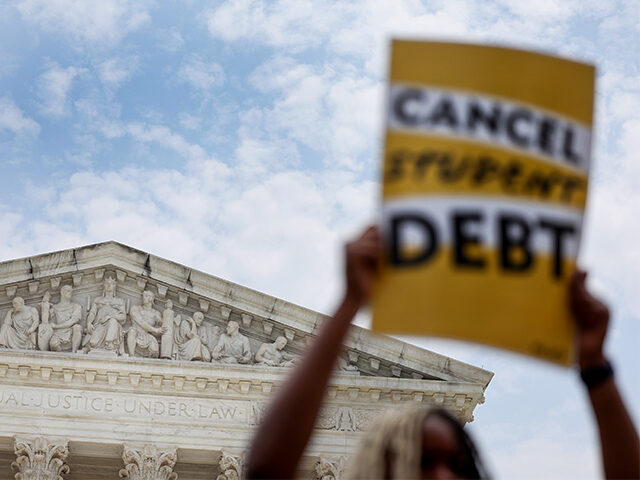The Biden administration is attempting to tackle student loan debt once more, months after the Supreme Court nixed the administration’s controversial $430 student loan debt transfer.
According to reports, the U.S. Department of Education is previewing its new plan to address student loan debt, which differs from the initial plan to “forgive” up to $20,000 per borrower for individuals who make less than $125,000 annually — a failed plan that President Biden announced August 2022.
In keeping with my campaign promise, my Administration is announcing a plan to give working and middle class families breathing room as they prepare to resume federal student loan payments in January 2023.
I'll have more details this afternoon. pic.twitter.com/kuZNqoMe4I
— President Biden (@POTUS) August 24, 2022
According to reports, the new plan is more narrowed and “will focus on certain groups of borrowers in its new plan, including those suffering from financial hardship or who entered in repayment decades ago.”
“But the Department of Education might try implementing it sooner, perhaps around the time of the election,” Kantrowitz said.
U.S. Secretary of Education Miguel Cardona said in a statement the administration is “diligently moving through the regulatory process to advance debt relief for even more borrowers.”
The Biden administration’s regrouping comes months after the Supreme Court struck down a mass student loan debt transfer, amounting to an estimated $430 billion. The Court struck down the policy 6-3, with Chief Justice John Roberts penning the majority opinion. Essentially, the Court ultimately concluded that Biden did not possess the authority to arbitrarily cancel such a large amount of debt singularly, without proper authorization from Congress.
As Breitbart News reported:
The Court considered two cases. … But in the second, Biden v. Nebraska, the Court held that the State of Nebraska had shown that Biden’s plan would hurt MOHELA, its nonprofit student loan provider.
In the opinion, Roberts also quoted former Speaker of the House Nancy Pelosi (D-CA), who admitted Biden did not have the constitutional authority to cancel student loan debt via executive powers alone, asserting that it “has to be an act of Congress.”
The opinion reads in part:
The sharp debates generated by the Secretary [of Education]’s extraordinary program stand in stark contrast to the unanimity with which Congress passed the HEROES Act. The dissent asks us to “[i]magine asking the enacting Congress: Can the Secretary use his powers to give borrowers more relief when an emergency has inflicted greater harm?” … The dissent “can’t believe” the answer would be no. … But imagine instead asking the enacting Congress a more pertinent question: “Can the Secretary use his powers to abolish $430 billion in student loans, completely canceling loan balances for 20 million borrowers, as a pandemic winds down to its end?” We can’t believe the answer would be yes. Congress did not unanimously pass the HEROES Act with such power in mind. … As then-Speaker of the House Nancy Pelosi explained:
“People think that the President of the United States has the power for debt forgiveness. He does not. He can postpone. He can delay. But he does not have that power. That has to be an act of Congress.” Press Conference, Office of the Speaker of the House (July 28, 2021).
All this leads us to conclude that “[t]he basic and consequential tradeoffs” inherent in a mass debt cancellation program “are ones that Congress would likely have intended for itself.” … In such circumstances, we have required the Secretary to “point to ‘clear congressional authorization’” to justify the challenged program. … And as we have already shown, the HEROES Act provides no authorization for the Secretary’s plan even when examined using the ordinary tools of statutory interpretation—let alone “clear congressional authorization” for such a program.
However, after the Court’s decision, Biden signaled that his administration would continue to seek ways to provide student debt relief.
“Today’s decision has closed one path,” Biden said. “Now we’re going to pursue another.”
Student loan payments resume in October after over three years, as they were originally paused in March 2020.

COMMENTS
Please let us know if you're having issues with commenting.